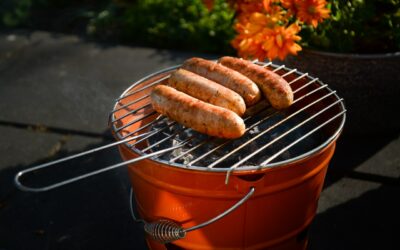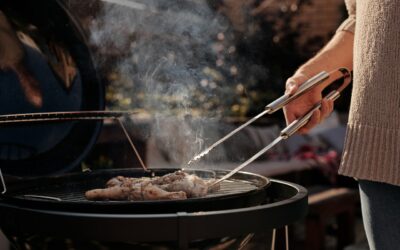What are the smells that you most associate with Summer? Is it the scent of flowers in the garden, such as roses, honeysuckle and jasmine? Or is it the smell of freshly mown grass that signals the arrival of Summer for you? Few people would disagree that the smell of food cooking on a BBQ speaks of warm Summer evenings and blue sky weekends more than most.
If you’re a fan of open air cooking, make sure you cook everything properly, particularly chicken and other poultry.
Why chicken poses more of a risk than other BBQ meat
Everyone knows that you can’t eat raw or under-cooked chicken but why is this the case? This is because raw chicken can carry some types of bacteria that cause food poisoning. Unlike other meats, chicken and other poultry often has its skin left on and this is where most of the bacteria can be found. Chicken is also more prone to harbouring bacteria because there are more nooks and crannies in chicken, such as in the wings and legs, where the bacteria can hide.
This means it’s more important to ensure that chicken is cooked thoroughly so that any bacteria is killed before the chicken is eaten.
How to make sure your chicken is cooked thoroughly
Use a food thermometer to check that the temperature in the thickest part of the chicken reaches 75c. You should also slice into it to check the juices and colour of the meat inside. Only when the juices run clear and none of the meat is pink can you be sure that it is properly cooked.
How to avoid contamination when you’re cooking chicken
But it’s not just about cooking chicken thoroughly that’s important. You also need to avoid cross contamination when you are preparing chicken or other poultry before you cook it. Here are a few basic rules:
- Never wash chicken. This is because water can spread any bacteria that may be sitting on the skin or surface of the chicken.
- Avoid cross contamination. Wash everything that comes into contact with raw chicken, including your hands, chopping board, knives, BBQ tongs and kitchen surfaces.
- If you marinade raw chicken before you cook it, don’t be tempted to pour the marinade over the chicken while it’s on the BBQ. This is just another form of cross contamination.
- Make sure you cover raw chicken well and store it at the bottom of the fridge to avoid any juices dripping down on to other food.
- Antibacterial spray. Use an antibacterial spray on any surface that comes into contact with raw chicken.
- Throw it out. If you are in any doubt about the safety of raw chicken, just throw it out rather than risk food poisoning.
Who is at particular risk of complications from food poisoning?
Anyone can get food poisoning, but certain groups of people are more vulnerable to illness than others. Their ability to fight germs and sickness is not as effective for a variety of reasons. This includes:
- Adults over the age of 65. As we get older, our immune systems become less effective which means we find it harder to fight off diseases and bacteria. Around half the people over the age of 65 who get food poisoning end up in hospital.
- Young children under the age of 5. The immune system in young children is still developing, making them more vulnerable to bacteria and illness. Young children are 3 times more likely to be hospitalised with food poisoning.
- People with weakened immune systems. This includes those receiving chemotherapy or radiotherapy treatment, diabetics and those with liver or kidney disease.
- Pregnant women. Women who are pregnant are more susceptible to germs, particularly those that cause food poisoning.



